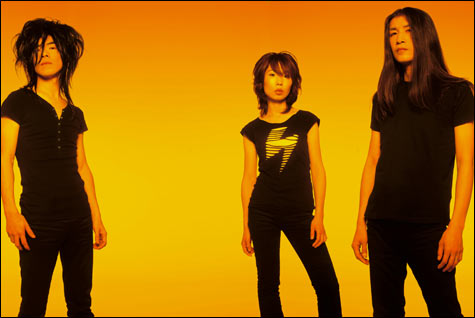
TUNE IN TOKYO: Smile might just be one of the most deconstructed and bizarre rock albums ever made. |
“I think any attempt at expression has to start from a point of resignation, of knowing that nothing is truly going to be communicated,” says Boris drummer/vocalist Atsuo.If this doesn’t sound like a quote from your typical rock drummer, that might be because Boris — who come to the Middle East downstairs this Friday — are not your typical rock band. Although they might seem just another Japanese drone-happy drop-tuned stoner-rock outfit, close inspection reveals instead a 16-year investigation of the meaning of sound and music itself. Their new Smile (Southern Lord) might just be one of the most deconstructed and bizarre rock albums ever made — or at least the most deconstructed and bizarre album to land in the “Rock/Pop” bin.

Boris’s rise to international acclaim has hardly been overnight: Smile is the band’s 18th album since their 1992 inception. Over time they’ve careered through more styles and moods than can be fathomed — from gentle folk to spacy drone to punishing full-throttle metal (often within the same song). Born out of a Tokyo scene open to novelty and intensity, Boris have been finding a place for their music in the Western world, and without the cutesy patronizing that often accompanies Japanese exports. (See: the 5.6.7.8.’s, Shonen Knife, Cibo Matto, etc.)
“We don’t have real expectations or demands,” says Atsuo. (He’s responding through a translator to my e-mailed questions.) “We enjoy all the different kinds of responses we get, including those times when audiences don’t seem to ‘understand’ us. Boris isn’t just for the members of the group. It’s a product of the various images many different people have of us. We, the members of the group, can’t control it.”
For a band this conceptual (their albums may be one long droning track, like 1996’s Absolutego, or speaker-shredding hardcore, like 2006’s Vein), Boris seem most concerned with seeking out musical purity. The results are often psychotic. “We’ve gotten to know more music as we’ve gotten older,” says Atsuo, “and the sounds our bodies naturally produce go in various different directions. We just record whatever we’re feeling at the moment, and the song eventually communicates to us which direction it will take. Our emotions are in constant flux.”
As varied as it is, the music of Boris tends to favor the experimental and textural over the technical, as witness the sonic density of the band’s recordings and the unrelenting knuckleheaded bullishness of their attack. “Over the years, our technical skill level hasn’t improved at all,” Atsuo continues. “All the members of the group hate practicing. We just record, listen carefully to what we’ve got to work with, including the mistakes, and in the process discover the potential in various sounds. And that’s how we’ve expanded our sound palette.”
A cursory listen to Smile makes this apparent: the record begins with a crescendo of noise and feedback that unclenches to reveal a sparse and unrushed cover of Japanese ’70s “supergroup” PYG’s “Flower Sun Moon.” But something isn’t right, even when the record kicks into overdrive on “Buzz-In” — there’s a fidgety uneasiness in the music that puts it at odds with the well-oiled rock machines we’re used to. Boris deal in true mayhem, true cacophony — even if it’s hidden among the most sing-songy of moments.
“I like songs you can sing along with,” says Atsuo. “The songs I used to listen to when I was little, like anime themesongs, are totally ingrained into my memory. I like that sort of thing. Like when you can listen to a song tens of years later and still remember the lyrics and melody.” And he’s not kidding. A complete headphone journey through Smile will leave you with two memories: the scraping feedback assault you’ve just endured and the lush melody of the caustically luxuriant “You Were Holding an Umbrella,” a nine-minute epic that owes an equal sonic debt to Nick Drake, King Crimson, and the more extreme moments of My Bloody Valentine. How hard is it to navigate and reconcile such divergent musical paths?
“We no longer have any musical direction,” says Atsuo. “As a band, we’re through. I don’t feel like we’re making music, and I don’t feel like we’re in a band. Our work has become a vehicle for creating new experiences, through various means of expression. Of course, I love music. But because I love it, I feel like it’s that much more important for me to really mess with it, you know? I feel like these two conflicting emotions are always with me. And I think this is expressed in our music.”
BORIS + TORCHE + CLOUDS | Middle East downstairs, 480 Mass Ave, Cambridge | July 11 at 9 pm | $15 | 617.864.EAST or www.mideastclub.com